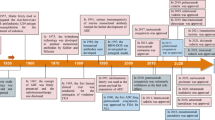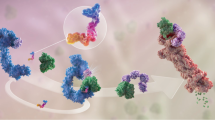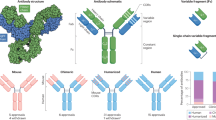Abstract
Background
The Ec peptide (PEc) that defines the IGF-1Ec isoform, is associated with prostate cancer progression by inducing proliferation, metastases, and tumour repair. On these grounds, an anti-PEc monoclonal antibody (MAb) was developed. Our objective is to examine the effects of this antibody on prostate cancer and its possible side effects.
Methods
The effects of the obtained MAb were examined in cancer and non-cancerous cell lines (unmodified and modified either to overexpress or silence PEc) and in tumours in SCID mice injected with unmodified prostate cancer cells. The investigation was obtained with respect to cellular proliferation, migration, invasion, toxicity to tumours, effects on the cell cycle, immune response activation, effects on mesenchymal stem cell mobilisation leading to tumour repair, tissue distribution, and toxicity to mice.
Results
Anti-PEc MAb treatment led to a significant decrease in cellular proliferation, migration, and invasion compared to the untreated cell lines (p < 0.0005 in every case). Mechanistically, these effects were associated with the downregulation of pERK1/2 and vimentin and the upregulation of E-Cadherin. In vivo, anti-PEc MAb treatment was associated with a significant decrease in tumour size and metastases rate (p < 0.0005 in every case) by reversing the tumours mesenchymal phenotype. It also inhibited host stem cell mobilisation towards the tumour, leading to apoptosis. Anti-PEc MAb assessment in respect to distribution and toxicity, indicated its tumour specificity and lack of toxicity.
Conclusions
These data indicate that the therapeutic targeting of PEc with the anti-PEc MAb may have considerable clinical benefit for prostate cancer patients.
This is a preview of subscription content, access via your institution
Access options
Subscribe to this journal
Receive 24 print issues and online access
$259.00 per year
only $10.79 per issue
Buy this article
- Purchase on Springer Link
- Instant access to full article PDF
Prices may be subject to local taxes which are calculated during checkout






Similar content being viewed by others
Data availability
1. The proteomics and phosphoproteomics datasets generated during and/or analysed during the current study have been deposited (and are available) to the ProteomeXchange Consortium via the PRIDE (Perez-Riverol et al., 2019) partner repository with the dataset identifier (title of the paper or the name of the corresponding author). 2. All the rest of the data generated or analysed during this study are included in this published article [and its supplementary information files].
References
Liu G, Zhu M, Zhang M, Pan F. Emerging role of IGF-1 in prostate cancer: a promising biomarker and therapeutic target. Cancers. 2023;15:1287.
Brahmkhatri VP, Prasanna C, Atreya HS. Insulin-like growth factor system in cancer: novel targeted therapies. Biomed Res Int. 2015;2015:538019.
Pierce JR, Martin BJ, Rarick KR, Alemany JA, Staab JS, Kraemer WJ, et al. Growth hormone and insulin-like growth Factor-I molecular weight isoform responses to resistance exercise are sex-dependent. Front Endocrinol (Lausanne). 2020;21:571.
Ascenzi F, Barberi L, Dobrowolny G, Villa Nova Bacurau A, Nicoletti C, Rizzuto E, et al. Effects of IGF-1 isoforms on muscle growth and sarcopenia. Aging Cell. 2019;18:e12954.
Dai Z, Wu F, Yeung EW, Li Y. IGF-IEc expression, regulation and biological function in different tissues. Growth Horm IGF Res. 2010;20:275–81.
Matheny RW Jr., Nindl BC, Adamo ML. Minireview: Mechano-growth factor: a putative product of IGF-I gene expression involved in tissue repair and regeneration. Endocrinology. 2010;151:865–75.
Schlegel W, Raimann A, Halbauer D, Scharmer D, Sagmeister S, Wessner B, et al. Insulin-like growth factor I (IGF-1) Ec/Mechano Growth factor-a splice variant of IGF-1 within the growth plate. PLoS One. 2013;8:e76133.
Armakolas A, Philippou A, Panteleakou Z, Nezos A, Sourla A, Petraki C, et al. Preferential expression of IGF-1Ec (MGF) transcript in cancerous tissues of human prostate: evidence for a novel and autonomous growth factor activity of MGF E peptide in human prostate cancer cells. Prostate. 2010;70:1233–42.
Armakolas A, Kaparelou M, Dimakakos A, Papageorgiou E, Armakolas N, Antonopoulos A, et al. Oncogenic role of the Ec peptide of the IGF-1Ec Isoform in prostate cancer. Mol Med. 2015;21:167–79.
Armakolas A, Dimakakos A, Loukogiannaki C, Armakolas N, Antonopoulos A, Florou C, et al. IL-6 is associated to IGF-1Ec upregulation and Ec peptide secretion, from prostate tumours. Mol Med. 2018;24:6.
Savvani A, Petraki C, Msaouel P, Diamanti E, Xoxakos I, Koutsilieris M. IGF-IEc expression is associated with advanced clinical and pathological stage of prostate cancer. Anticancer Res. 2013;33:2441–5.
Xoxakos I, Petraki C, Msaouel P, Armakolas A, Grigorakis A, Stefanakis S, et al. Expression of Kisspeptin (KISS1) and its Receptor GPR54 (KISS1R) in prostate cancer. Anticancer Res. 2020;40:709–18.
Bastide C, Bagnis C, Mannoni P, Hassoun J, Bladou F. A Nod Scid mouse model to study human prostate cancer. Prostate Cancer Prostatic Dis. 2002;5:311–5.
Tanaka S, Kobayashi W, Haraguchi M, Ishihata K, Nakamura N, Ozawa M. Snail1 expression in human colon cancer DLD-1 cells confers invasive properties without N-cadherin expression. Biochem Biophys Rep. 2016;8:120–6.
Li H, Batth IS, Qu X, Xu L, Song N, Wang R, et al. IGF-IR signaling in epithelial to mesenchymal transition and targeting IGF-IR therapy: overview and new insights. Mol Cancer. 2017;16:6.
Osher E, Macaulay VM. Therapeutic targeting of the IGF axis. Cells. 2019;8:895.
Simpson A, Petnga W, Macaulay VM, Weyer-Czernilofsky U, Bogenrieder T. Insulin-Like Growth Factor (IGF) pathway targeting in cancer: role of the IGF axis and opportunities for future combination studies. Target Oncol. 2017;12:571–97.
Gao J, Chesebrough JW, Cartlidge SA, Ricketts SA, Incognito L, Veldman-Jones M, et al. Dual IGF-I/II–neutralizing antibody MEDI-573 potently inhibits IGF signaling and tumour growth. Cancer Res. 2011;71:1029–40.
Olmos D, Okuno S, Schuetze SM, Paccagnella ML, Yin D, Gualberto A, et al. Safety, pharmacokinetics and preliminary activity of the anti–IGF-IR antibody CP-751,871 in patients with sarcoma. JCO Suppl. 2008;6:122.
Kurzrock R, Patnaik A, Aisner J, Warren T, Leong S, Benjamin R, et al. A phase I study of weekly R1507, a human monoclonal antibody insulin-like growth factor-I receptor antagonist, in patients with advanced solid tumours. Clin Cancer Res. 2010;16:2458–65.
Al-Samerria S, Radovick S. The role of Insulin-like Growth Factor-1 (IGF-1) in the control of neuroendocrine regulation of growth. Cells. 2021;10:2664.
Yakar S, Rosen CJ, Beamer WG, Ackert-Bicknell CL, Wu Y, Liu JL, et al. Circulating levels of IGF-1 directly regulate bone growth and density. J Clin Investig. 2002;110:771–81.
Prosser CG. Insulin-like growth factors in milk and mammary gland. J Mammary Gland Biol Neoplasia. 1996;1:297–306.
Hong H, Cui ZZ, Zhu L, Fu SP, Rossi M, Cui YH, et al. Central IGF1 improves glucose tolerance and insulin sensitivity in mice. Nutr Diabetes. 2017;7:2.
Kandalla PK, Goldspink G, Butler-Browne G, Mouly V. Mechano Growth Factor E peptide (MGF-E), derived from an isoform of IGF-1, activates human muscle progenitor cells and inducean increase in their fusion potential at different ages. Mech Ageing Dev. 2011;132:154–62.
Hill M, Wernig A, Goldspink G. Muscle satellite (stem) cell activation during local tissue injury and repair. J Anat. 2003;203:89–99.
Hill M, Goldspink G. Expression and splicing of the insulin-like growth factor gene in rodent muscle is associated with muscle satellite (stem) cell activation following local tissue damage. J Physiol. 2003;549:409–18.
Stavropoulos A, Varras M, Philippou A, Vasilakaki T, Varra VK, Varra FN, et al. Immunohistochemical expression of insulin-like growth factor-1Ec in primary endometrial carcinoma: Association with PTEN, p53 and survivin expression. Oncol Lett. 2020;20:395.
Karagiannis AK, Philippou A, Tseleni-Balafouta S, Zevolis E, Nakouti T, Tsopanomichalou-Gklotsou M, et al. IGF-IEc expression is associated with advanced differentiated thyroid cancer. Anticancer Res. 2019;39:2811–9.
Christopoulos PF, Msaouel P, Koutsilieris M. The role of the insulin-like growth factor-1 system in breast cancer. Mol Cancer. 2015;14:43.
Alexandraki KI, Philippou A, Boutzios G, Theohari E, Koutsilieris M, Kassiani Delladetsima I, et al. IGF-IEc expression is increased in secondary compared to primary foci in neuroendocrine neoplasms. Oncotarget. 2017;8:79003–11.
Alagaratnam S, Loizidou M, Yang SY, Fuller B, Ramesh B. Increased expression of IGF-1Ec with increasing colonic polyp dysplasia and colorectal cancer. J Cancer Res Clin Oncol. 2020;146:2861–70.
Acknowledgements
Part of the work of this study was supported by “The Greek Research Infrastructure for Personalised Medicine (pMED-GR)” (MIS 5002802) which is implemented under the Action “Reinforcement of the Research and Innovation Infrastructure”, funded by the Operational Programme “Competitiveness, Entrepreneurship and Innovation” (NSRF 2014-2020) and co-financed by Greece and the European Union (European Regional Development Fund). We would also like to thank Professors C. Consoulas and C. Palikaras for their useful comments regarding the presentation of the data in the present article.
Funding
This study was financed by the Physiology Laboratory and the National and Kapodestrian University of Athens.
Author information
Authors and Affiliations
Contributions
AA: Study design, designing and obtaining the constructs, generation of tumours into SCID mice, IF, Ab administration, tumour follow-up, cell culture experiments, writing of the paper. NA: In charge of the clinical part of the study, collection of patient material and clinicopathological characteristics of the patients, MS: Cell culture experiments, tumour removal, sentinel node staining, and removal. CP: Patient immunohistochemistry and evaluation. GA: Animal immunohistochemical analysis and evaluation. MS: Proteomics analysis, phosphoproteomics analysis, GP: Proteomics and phosphoproteomics evaluation, EC: Statistical analysis. MK: Contribution to the study design and in the writing of the paper.
Corresponding author
Ethics declarations
Competing interests
The authors declare no competing interests.
Ethics approval and consent to participate
A written informed consent (IC) was obtained from all the patients prior to participation in the present study (attached). The study has been approved by the Institutional Ethics Committee and all the experimental procedures conformed to the Declaration of Helsinki (attached).
Additional information
Publisher’s note Springer Nature remains neutral with regard to jurisdictional claims in published maps and institutional affiliations.
Supplementary information
Rights and permissions
Springer Nature or its licensor (e.g. a society or other partner) holds exclusive rights to this article under a publishing agreement with the author(s) or other rightsholder(s); author self-archiving of the accepted manuscript version of this article is solely governed by the terms of such publishing agreement and applicable law.
About this article
Cite this article
Armakolas, A., Alevizopoulos, N., Stathaki, M. et al. Anti-PEc: Development of a novel monoclonal antibody against prostate cancer. Br J Cancer (2024). https://doi.org/10.1038/s41416-024-02713-8
Received:
Revised:
Accepted:
Published:
DOI: https://doi.org/10.1038/s41416-024-02713-8



